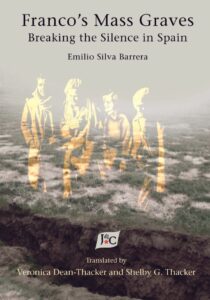Book Review: Franco’s Mass Graves
 Franco’s Mass Graves: Breaking the Silence in Spain, by Emilio Silva Barrera. Translated by Veronica Dean-Thacker and Shelby G. Thacker. Newark, Del.: Juan de la Cuesta. 172 pp.
Franco’s Mass Graves: Breaking the Silence in Spain, by Emilio Silva Barrera. Translated by Veronica Dean-Thacker and Shelby G. Thacker. Newark, Del.: Juan de la Cuesta. 172 pp.
The journalist Emilio Silva Barrera (born in Elizondo, Navarra, Spain, in 1965) belongs to the generation of grandchildren of those who experienced the Spanish Civil War as adults. His grandfather and namesake, a politically moderate small business owner in a small town in Northwestern Spain, was first harassed and extorted, later arrested, killed, and thrown into an unmarked mass grave by local fascist thugs in October of 1936, just a few months after the coup d’etat of July 17-18. The family store and its inventory were confiscated. Without any savings or source of income, Emilio’s grandmother, Modesta, was left to care for four sons—Emilio’s father and three uncles—and would have to live among her husband’s assassins for the duration of the Franco regime and, indeed, for the rest of her life. For all of those long decades, whenever the story of her husband would come up in the family house—always in whispers—Modesta’s fist would inevitably come down hard on the kitchen table, imposing the silence of fear and survival.
Second generation: Emilio’s father and uncles, as young boys, had taken food and clothes to their father in the makeshift jail where he was held after being arrested and before being murdered. Emilio’s father was only ten years old when his father was executed, but he would never again step foot in a classroom. He was now the breadwinner. That heavy silence of fear and survival became the very air that the children of Emilio and Modesta breathed, as the offspring of “un rojo” who, after all, was probably guilty of something…
Third generation: Emilio himself was ten years old when Francisco Franco died in bed in 1975. So most of Emilio’s formal education took place in a democratic post-Franco Spain. He studied sociology at the Universidad Complutense de Madrid and went on to work as a journalist. But some traumas do get transmitted from generation to generation, some lessons do get tacitly ingrained in children and grandchildren. “Don’t stick your head out. Just try to blend in. Don’t ask too many questions. Don’t dare to dream, because those who live dreaming end up being killed, like your grandfather, by reality.” Emilio, introverted and insecure, watched how Spain fashioned a triumphant transition to democracy without even a nod toward the truncated promise of the Second Republic, just as he was expected to forge a future for himself without thinking too much about his absent grandfather, abandoned somewhere in a ditch.
Emilio eventually revolted against this state of affairs, against the imposed silence; he became obsessed with his grandfather’s “disappearance”, and indefatigably investigated the case. In the end, he was able to locate the mass grave where his grandfather and twelve other victims had been buried. He led a scientific exhumation of the grave, and proved through DNA testing that he had in fact unburied the remains of his grandfather. The exhumation of “The Thirteen of Priaranza” received a good deal of media attention, and before long, thousands of families reached out to Emilio for assistance in searching for their own loved ones. A silence, both personal and collective, had been broken. A movement had been born.
Franco’s Mass Graves: Breaking the Silence in Spain is the much-needed English translation of the shout emitted by Emilio Silva once he managed to recover his voice and his dignity at the foot of his grandfather’s tomb in October, 2000. The original version of the book was published in 2003; in this clear and precise translation, Emilio tells the story of his family, and of the historic exhumation and its aftermath, just as he gathers, in the body of the text and in a number of addenda, a valuable archive or casebook, that includes photographs, newspaper clippings, personal letters, United Nations reports and even excerpts of Spanish legislation.
What will the great-grandchildren of those who lived through the Spanish Civil War do, now that revisionist oblivion seems to be all the rage? What will the great-grandchildren of those who helped defeat fascism in World War II do, now that the uniform of fascism looks more like a business suit than anything else? One can only hope that they read this book.
James D. Fernández teaches at NYU and is co-editor of this magazine.












